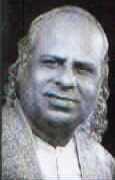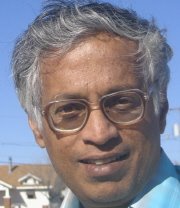The resonance of Omkar
Dr. K.Rohiniprasad

One of the important vocalists of Gwalior gharana was Omkarnath Thakur (1897-1967). Mahatma Gandhi heard him once and said “Omkarnathji can achieve through a single song of his, what I cannot achieve through several speeches."
Born in Jahaaj in the Cambay area, Omkarnath was the fourth child of Gaurishankar Thakur, a warrior turned spiritual recluse. Brought up by his toiling mother, Omkarnath had a very tough childhood but led a disciplined life. This helped him continue with physical exercises, swimming, and wrestling apart from music right up to his old age. He worked as a cook and later as mill-hand to supplement his mother’s meagre earnings. He learnt to read and write from some Jain monks and learnt later several languages including Hindi, Marathi, English, Sanskrit, Bengali, Punjabi, Urdu and Nepali on his own.
Omkarnath’s musical talent prompted a philanthropist to help him join Vishnu Digambar Paluskar's music school in Bombay. The boy served his teacher like a devoted son for about six years and became his favourite disciple. He used to spend nearly 18 hours a day teaching and practising. In 1916 he was appointed principal of the Gandharva Mahavidyalaya in Lahore at the age of 20. In 1918 he went to Baroda as music examiner and impressed the Maharaja. His concert at the Harvallabh-mela of Jalandhar made as much impression as that of the veteran Bhaskarbuwa Bakhle. With his compelling, resilient voice and wide tonal range Omkarnath became a highly successful concert musician, performing all over the country. His presentation of music with appropriate hand gestures was a visual treat too.
In 1924 and 1930 Omkarnath visited Nepal and won admiration, honours and awards from the Maharaja there. Refusing the post of a court musician, Omkarnath returned home to take care of his mother. As his fame spread far and wide he was invited to sing in music conferences in Mysore, Hyderabad, Bengal and other places. In 1931 he went to Italy to participate in the International Music Conference in Florence and reportedly cured Mussolini of his insomnia with music. He gave music recitals and lecture-demonstrations in Germany, Holland, Belgium, France, London, Wales, Switzerland, Afghanistan etc. As he was proceeding to Russia he learnt of his wife’s demise during childbirth and returned home.
In Bombay Omkarnath started Sangeet Niketan but took over as the first Dean of the music faculty at the Benares Hindu University in 1950. He wrote musical treatises like Sangeetanjali and Pranav Bharati. His magnetic personality, high musical calibre both as a singer and as a musicologist, compassion, administrative acumen, oratory, infinite patience and deep love for his disciples made him a larger-than-life personality as performer, composer, educationist and theoretician.
He won the Padma Sri (1955), Sangeet Prabhakar from Madan Mohan Malaviya, Sangeet Martand from the Calcutta Sanskrit Mahavidyalaya (1940), and Sangeet Mahamahodaya from Nepal (1930). His disciples include Premlata Sharma, Yashwantrai Purohit, Balwantrai Bhatt, Kanakrai Trivedi, Shivkumar Shukla, Phiroj Dastur, Bijonbala Ghosh Dastidar, Dr. N. Rajam, Rajbhau Sontakke, Smt. Subhadra Kulshreshta, Atul Desai, P.N Barwe, Nalini Gajendragadkar, and others.
Omkarnath was a great patriot and his Vande Mataram won wide acclaim. He was elected President of the Bhadoch Congress Committee, and member of the Gujarat Provincial Congress Committee. A deeply religious man, Omkarnath studied the Ramcharitamanas and recited it daily for 25 years continuously. His life was an example of morality, self-discipline and austerity. A moderate eater, strict vegetarian, fastidious in cleanliness, absolutely free from vices of any kind, and a stickler to punctuality, he set an example to other musicians and teachers. He suffered paralysis and passed away in 1967 and a postage stamp was issued in his memory.


0 Comments:
Post a Comment
<< Home